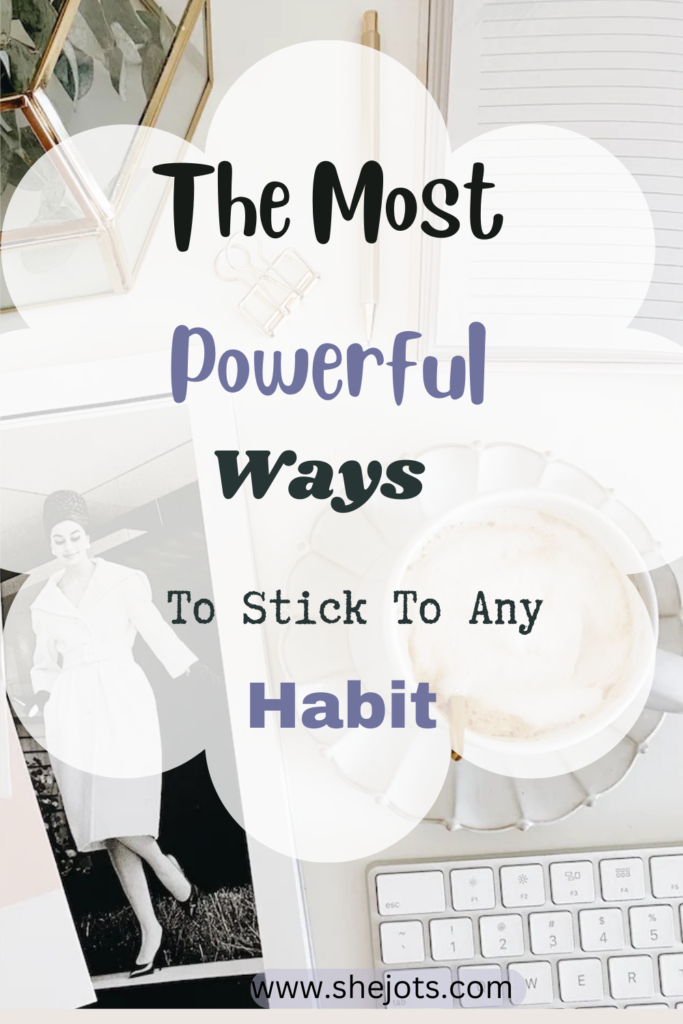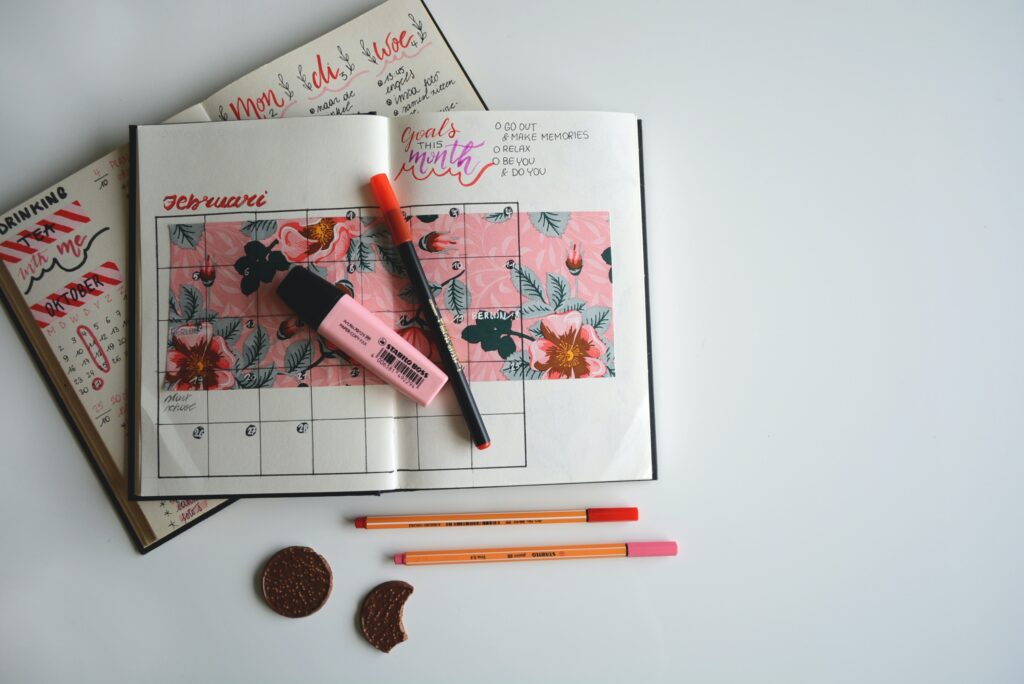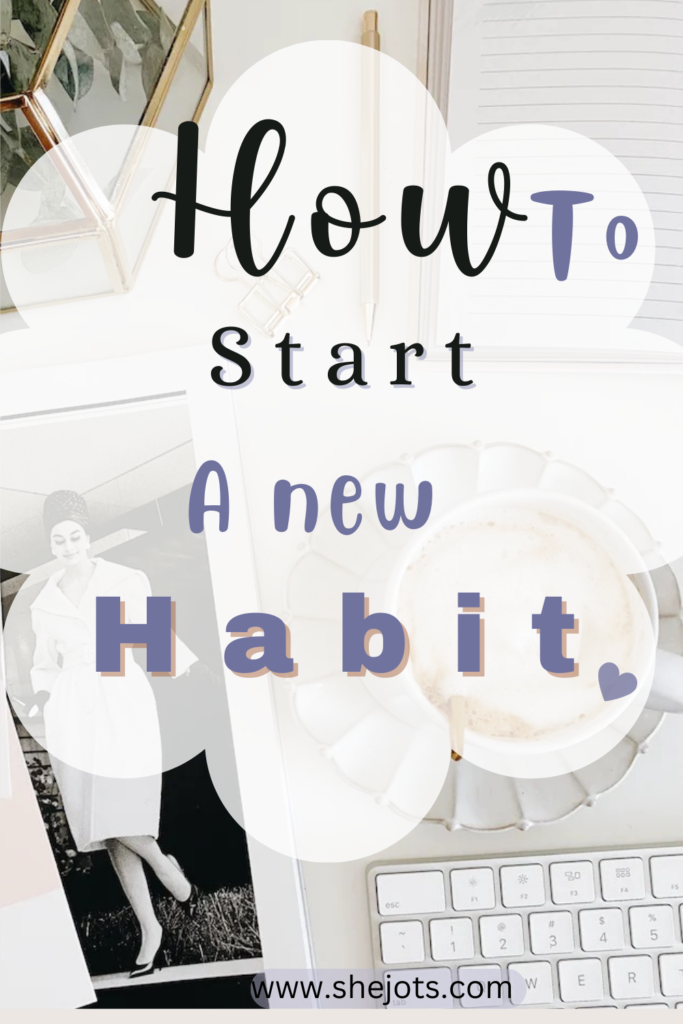How many times did you try to start a new habit and could not stick to it?
If you've ever felt a twinge of frustration about not sticking to a new habit, know that you're not alone.
Well, friend, the struggle with habits is a story many of us share.
There have been numerous occasions where I set out with the best intentions, only to find myself facing the familiar challenge of sticking to the plan.

Today, I'm excited to share a bit of my personal journey with you, I won't swap stories but experiences.
How I could build and stick on healthy and successful new habit which made me who I am today.
I'm a full-time writer, poet and a part-time teacher.
Let's be real, breaking old routines can feel like a battle. It requires a conscious effort, a sprinkle of resilience, and a whole lot of commitment to the path of self-improvement.
As I started this journey, I quickly realized that the small, daily choices mattered more than I thought. Each intentional step I took became a brick in the foundation of a new, positive way of living. Sure, it wasn't always easy.
There were days when sticking to my new habit felt like navigating uncharted waters. But you know what? Those days were the game-changers.

What is a Habit?
Before we dive into the mechanics of building habits, let's understand what habits really are.
At their core, habits are the repeated actions that shape our daily lives.
They're the rituals, routines, and behaviors that we perform almost automatically, often without conscious thought, Whether it's brushing your teeth, grabbing a cup of coffee in the morning, or scrolling through your phone before bed, habits are the silent architects shaping our daily routine.
Habits operate on a simple loop: cue, routine, reward.
There's a trigger or cue that initiates the habit, followed by the routine itself, and then a reward that reinforces the behavior.
This loop is like the structure of our daily lives, influencing everything from our morning rituals to how we unwind in the evening.

How to form a habit psychology?
Forming a habit involves understanding the psychology behind behavior change.
Let's explore the psychological aspects of habit formation and how you can leverage them to create lasting changes in your life.
1. Cue-Routine-Reward Loop:
At the core of habit formation is the cue-routine-reward loop. It starts with a cue or trigger, followed by the routine (the habit itself), and concludes with a reward. The brain associates the reward with the habit, reinforcing the behavior. Understanding and consciously manipulating this loop is fundamental to habit formation.
2. Start Small and Gradual:
The brain is wired to seek pleasure and avoid pain. When forming a new habit, start with small, manageable steps.
This reduces the perceived pain or effort associated with the habit, making it more likely to stick.
As you experience success, your brain releases dopamine, reinforcing the habit loop.
3. Consistency is Key:
Consistency is crucial for habit formation.
Repeatedly performing the same action in a specific context strengthens the neural pathways associated with the habit.
Consistency makes the behavior more automatic and reduces the cognitive load associated with decision-making.
4. Use Triggers and Associations:
Leverage existing habits or create new triggers to prompt the desired behavior.
Associating your new habit with an established routine or a specific cue helps signal to your brain that it's habit time.
For example, if you want to develop a reading habit, link it to your daily coffee break.
5. Immediate Rewards:
Immediate rewards reinforce the habit loop effectively.
If possible, design your habits to provide a sense of satisfaction or pleasure right away.
This can be as simple as acknowledging your accomplishment, enjoying a healthy snack, or taking a moment to appreciate your efforts.
6. Visualize Success:
Visualization is a powerful psychological tool.
Envisioning yourself successfully completing the habit creates a mental blueprint that primes your brain for success.
It activates the same neural circuits as actually performing the behavior.
7. Accountability and Social Support:
Humans are social creatures, and accountability plays a significant role in habit formation.
Share your goals with friends, family, or a supportive community.
Knowing that others are aware of your commitment can boost motivation and provide encouragement.
8. Use Positive Reinforcement:
Positive reinforcement involves rewarding yourself for successfully sticking to your habit.
This could be a small treat, a moment of relaxation, or any other reward that brings you joy.
Positive reinforcement strengthens the neural connections associated with the habit.
9. Understand and Address Triggers:
Identify the triggers that may lead to undesirable habits and address them.
Whether it's stress, boredom, or certain environmental cues, understanding these triggers allows you to replace negative habits with positive ones.
10. Patience and Persistence:
Habits don't form overnight. Be patient with yourself and stay persistent.
The more you repeat the behavior, the more ingrained it becomes.
Even if you face setbacks, view them as part of the learning process and an opportunity to refine your approach.
By aligning your habit-building efforts with these psychological principles, you can cultivate behaviors that become second nature over time.
Remember, it's not just about changing what you do; it's about rewiring how you think and respond to cues in your environment.

How to start a new habit?
Here are 5 steps to start a new habit and make it work for you.
Starting a New Habit
- Define Your Why: Before diving into a new habit, ask yourself why it matters. What's the deeper purpose or goal behind it? When your habit is rooted in personal significance, it becomes a source of motivation.
- Start Small and Specific: The journey of a thousand miles begins with a single step. Start with a small, manageable action that aligns with your larger goal. Specificity is key—clearly define what your new habit looks like in practical terms.
- Anchor to Existing Habits: Piggyback your new habit onto an existing one. This connection provides a cue, making it easier to remember and integrate into your routine. For example, if you're establishing a morning stretching routine, connect it to your coffee ritual.
- Create a Trigger: Choose a specific trigger that prompts your habit. It could be a time of day, a visual cue, or an event. The trigger acts as a reminder, signaling that it's habit time. Consider setting a daily reminder on your phone or placing a visual cue in your environment.
- Build Gradually: Rome wasn't built in a day, and neither are habits. Rather than overwhelming yourself, focus on gradual progression. Start with a frequency that feels achievable, and as the habit becomes ingrained, you can increase the intensity or duration.

So, after learning about habit and how it works it's time to make it consistently change and reshape your life better, here is the juicy part of sticking to your daily habits.
Ready ?
Establishing new habits and making them enjoyable and motivating requires a combination of understanding your motivations, setting realistic goals, and creating a positive environment.
Let's break it down:
Identify Your Motivation
- Clearly define why you want to develop a particular habit. Understanding the underlying motivation helps in staying committed.
- Ask yourself how the habit aligns with your long-term goals and values. This connection provides a sense of purpose.
Start Small
First things first, let's not overwhelm ourselves.
Begin with small, manageable habits that you can easily incorporate into your daily routine.
For example, instead of committing to an hour of exercise every day, start with a 15-minute walk. Specificity is key, so define exactly what you want to achieve.
- Begin with small, manageable steps. It's easier to stay committed to a new habit when the initial task feels achievable.
- Gradually increase the complexity or duration as the habit becomes ingrained in your routine.
Connect Habits to Existing Routines instead of Create a new Routine
One effective way to build new habits is to attach them to existing routines.
If you're trying to develop a reading habit, link it to your morning coffee or before-bed routine. This creates a natural flow and makes it easier for the habit to become a seamless part of your day.
- Establish a consistent time and place for your new habit. Repetition helps to solidify the behavior.
- Associate the habit with an existing routine or activity to make it easier to remember.
Set Realistic Goals
- Make your goals specific and measurable. Instead of saying, "I want to exercise more," specify how often and for how long. For instance, "I will exercise for 30 minutes, three times a week." This clarity helps you track progress.
- Take into account your daily routine, responsibilities, and lifestyle. Ensure your goals are realistic within the context of your life. If you have a busy schedule, setting aside several hours for a new habit every day might not be sustainable.
- Assess your current skill level or capacity related to the habit you want to develop. Setting goals that align with your current abilities helps prevent disappointment and establishes a solid foundation for improvement.
- Define specific, measurable, achievable, relevant, and time-bound (SMART) goals.
- Celebrate small victories along the way. Acknowledging progress can be a powerful motivator.
Make It Enjoyable
Let's face it – if it's not enjoyable, it's hard to stick with it. Choose habits that align with your interests and passions. When you enjoy the process, it becomes easier to stay committed. Infuse elements of enjoyment into your daily routine, making it something you look forward to rather than a chore.
If you're trying to get fit but hate the gym, explore activities like dancing, hiking, or even joining a sports club. When you enjoy the process, it won't feel like a chore.
- Find ways to make the habit enjoyable. This could involve incorporating activities or elements you like.
- Consider adding elements of fun or creativity to the habit. The more enjoyable it is, the more likely you'll stick with it.
Accountability
Share your goals with friends or family who can act as your accountability buddies.
Having someone to share the journey with not only adds an element of friendly competition but also provides mutual support and encouragement.
I really love sharing them as challenges in the family or friends group chat, it really helps motivating and works for me.
- Share your goals with friends, family, or colleagues. Having someone to hold you accountable can boost motivation.
- Consider joining a group or finding a buddy with similar goals to provide mutual support.
Track Your Progress
Keep a record of your achievements. Tracking your progress not only helps you stay motivated but also allows you to reflect on how far you've come. This can be particularly encouraging during challenging times.
- Keep a journal or use apps to track your progress. Seeing how far you've come can be motivating.
- Reflect on the positive changes and benefits the habit has brought into your life.
Adapt and Adjust
Understand that setbacks are a normal part of forming new habits. Instead of getting discouraged, view them as opportunities to learn and adjust your approach. Be flexible and willing to adapt your strategy as needed.
- Be flexible and willing to adapt your approach if needed. Life is dynamic, and your habits may need to evolve as well.
- If a particular strategy isn't working, don't be afraid to modify it. Experiment with different approaches until you find what works best for you.
Incorporate Rewards
Celebrate your successes along the way. Whether it's completing a week of consistent habit-building or reaching a specific goal, take the time to acknowledge your achievements. Positive reinforcement boosts motivation.
- Design a reward system for yourself. Treat yourself when you achieve milestones to reinforce the positive behavior.
- The rewards don't have to be extravagant; even small incentives can make a significant impact.
Be Flexible
Life is unpredictable, and circumstances may change. Be open to adjusting your goals when needed. If you encounter unexpected challenges, it's okay to modify your approach while staying committed to the habit.
Be kind to yourself and embrace flexibility. If you miss a day, don't let guilt overshadow your progress. Adjust, adapt, and get back on track the next day.
Focus & Trust the Process
Focusing on the process and trusting it is a fundamental aspect of successfully building new habits.
- Instead of fixating on the end goal, pay attention to the process and the positive changes it brings to your life.
- Cultivate a mindset of enjoying the journey rather than just the destination.
Patience is Key
Rome wasn't built in a day, and neither are habits. Cultivate patience and recognize that change takes time. Avoid the temptation to rush the process, as sustainable habits develop through consistent, gradual efforts.
Remember, the key is to enjoy the journey of self-improvement. By implementing these strategies and staying patient with yourself, you'll find that forming new habits becomes a rewarding and sustainable part of your lifestyle.
Remember, building new habits is a gradual process, and setbacks are a natural part of it. Be patient with yourself, stay positive, and keep refining your approach based on your experiences.



